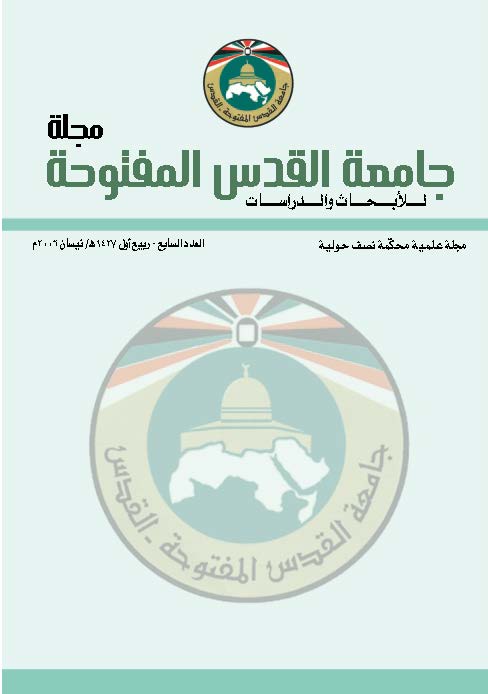The Reality of Cognitive and Affective Domains among High School Students during the Second Intifada in light of some Variables
Keywords:
Cognitive and Affective Domains, High School Students, the Second Intifada, Variables, West bank,Abstract
The study aimed at diagnosing the reality of learning preferences for
cognitive and affective domains of high school students during the Al-Aqsa
Intifada and whether these domains have been negatively affected in the
light of few independent variables such as gender, academic stream, and
place of residence. The study targeted the reality of the southern and middle
area of Palestine.
The researcher has furnished the following hypotheses to reveal the
reality:
1- There are no significant statistical differences at the level of (0.05= )
among the means of responses of students in their reality of learning
preferences (cognitive and their affective domains during Al-aqsa
Intifada related to gender).
2- There are no significant statistical differences at the level of (0.05= )
among the means of responses of students in their reality of learning
preferences (cognitive and affective domains during Al-aqsa Intifada
related to academic stream).
3- There are no significant statistical differences at the level of (0.05= )
among the means of responses of students in their reality of learning
preferences (cognitive and affective domains during Al-aqsa Intifada
related to place of residence).
The researcher followed the procedural descriptive approach as a
methodology of the study and consequently used both descriptive and
inferential statistical (t-test, One way Anova). Referee and constructive
validation procedures along with Reliability (Cronbach Alpha) were used to
sea into suitability of the questionnaire. The questionnaire reflected seven
cognitive and affective domains that were affected by the Intifada (recall,
scientific inquiry, application, principles, assiduity, responsibility, and
motivation).
Results were:
1. Cognitive and affective preferences of students were negatively affected
by the Israeli practices in the domains of recall, principles, motivation,
and assiduity.
2. There were no significant statistical difference at the level of (0.05 = )
between the reality of cognitive and affective preferences among students
during the Al-Aqsa Intifada related to sex.
3. There were no significant statistical differences at the level of (0.05 = )
between the reality of cognitive and affective preferences among students
during the Al-Aqsa Intifada related to academic stream.
4. There were no significant statistical differences at the level of (0.05 = )
between the reality of cognitive and affective preferences among students
during the Al-Aqsa Intifada related to place of residence.
Downloads
Published
How to Cite
Issue
Section
License
- The editorial board confirms its commitment to the intellectual property rights
- Researchers also have to commit to the intellectual property rights.
- The research copyrights and publication are owned by the Journal once the researcher is notified about the approval of the paper. The scientific materials published or approved for publishing in the Journal should not be republished unless a written acknowledgment is obtained by the Deanship of Scientific Research.
- Research papers should not be published or republished unless a written acknowledgement is obtained from the Deanship of Scientific Research.
- The researcher has the right to accredit the research to himself, and to place his name on all the copies, editions and volumes published.
- The author has the right to request the accreditation of the published papers to himself.













_2.png)
_.png)
_2.png)
_1.png)
_.png)

